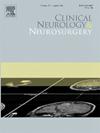Drivers of neurosurgeon selection among operative intracranial tumor patients
IF 1.8
4区 医学
Q3 CLINICAL NEUROLOGY
引用次数: 0
Abstract
Objective
Despite increased access to online information, little is known about what factors patients consider when selecting a neurosurgeon for intracranial tumor resection. This study aims to identify patient priorities in neurosurgeon selection.
Methods
Patients who underwent intracranial tumor resection between January 1, 2023, and January 31, 2024, at a single institution were surveyed. They ranked 13 factors on a 5-point Likert scale. Survey data were analyzed alongside demographic and clinical information using ordinal logistic regression.
Results
Fifty patients (mean age 54.15 ± 13.82; 54 % female; 70 % white; 70 % privately insured) completed the survey. Surgeon caseload and procedure-specific experience (mean score 4.64 ± 0.72) were rated as most important, followed by hospital ranking (4.48 ± 0.68), years of experience (4.38 ± 0.75), and surgeon interpersonal skills (4.2 ± 1.14). Least important were social media presence, age, and word of mouth.
Subgroup analysis revealed that non-Caucasian patients valued word of mouth more (OR: 1.65), while patients undergoing repeat surgery valued it less (OR: 0.33). Older patients, non-Caucasians, ethnic minorities, and married individuals placed less importance on medical school prestige.
Conclusion
Neurosurgical patients prioritize surgeon experience, hospital reputation, and interpersonal qualities. These insights can inform provider transparency, resource allocation, and outreach to underserved groups.
颅内肿瘤手术患者神经外科医生选择的驱动因素
目的:尽管网上信息越来越多,但对于患者在选择颅内肿瘤切除术的神经外科医生时考虑的因素知之甚少。本研究旨在确定患者在选择神经外科医生时的优先级。方法对2023年1月1日至2024年1月31日在同一医院行颅内肿瘤切除术的患者进行调查。他们用李克特5分制对13个因素进行了排名。使用有序逻辑回归分析调查数据以及人口统计和临床信息。结果50例患者平均年龄54.15 ± 13.82;54 %女;70白色 %;70 (私人保险百分比)完成了调查。外科医生的病例量和手术经验(平均得分4.64 ± 0.72)被评为最重要的,其次是医院排名(4.48 ± 0.68)、经验年数(4.38 ± 0.75)和外科医生的人际交往能力(4.2 ± 1.14)。最不重要的是社交媒体曝光率、年龄和口碑。亚组分析显示,非白种人患者更重视口碑(OR: 1.65),而接受重复手术的患者更不重视口碑(OR: 0.33)。老年患者、非白种人、少数民族和已婚人士对医学院声誉的重视程度较低。结论神经外科患者优先考虑外科医生经验、医院声誉和人际关系素质。这些见解可以告知提供者透明度、资源分配和向服务不足群体的扩展。
本文章由计算机程序翻译,如有差异,请以英文原文为准。
求助全文
约1分钟内获得全文
求助全文
来源期刊

Clinical Neurology and Neurosurgery
医学-临床神经学
CiteScore
3.70
自引率
5.30%
发文量
358
审稿时长
46 days
期刊介绍:
Clinical Neurology and Neurosurgery is devoted to publishing papers and reports on the clinical aspects of neurology and neurosurgery. It is an international forum for papers of high scientific standard that are of interest to Neurologists and Neurosurgeons world-wide.
 求助内容:
求助内容: 应助结果提醒方式:
应助结果提醒方式:


